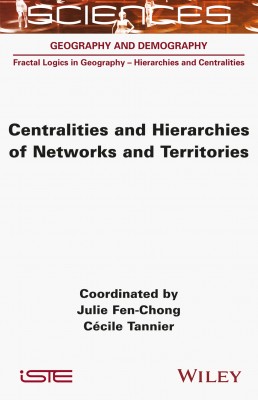
Digital data, graph theory and spatial modeling allow us to apply the concepts of centralities and hierarchies to a wide variety of spatial situations.
The authors of this book offer insight into centralities and hierarchies within networks and territories at different scales and temporalities and for different socio-spatial phenomena. The first part of the book explores the contribution of data from cell phones and social networks to understanding the centralities and hierarchies of urban space within a circumscribed temporality. The second part uses network analysis – ecological networks, media networks and scientific knowledge networks – to propose indicators of spatial organization that reveal the centralities and hierarchies of spatial systems. Finally, in the third part, the territorial processes behind the formation of centralities and hierarchies are presented from a long-term perspective.
Part 1. Spatial Practices as Indicators of Centralities and Hierarchies.
1. Urban Hierarchies and Centralities Through the Prism of Tweets and Telephone Calls, Julie Fen-Chong.
2. Measuring Ephemeral Centralities in Territories and Networks, Françoise Lucchini.
Part 2. Networks as Creators of Centralities and Hierarchies.
3. Structures of Today’s World: Geographical Imaginaries of the Press, Robin Lamarche Perrin, Romain Leconte and Étienne Toureille.
4. Geography of Research Activities and Urban Hierarchies, Marion Maisonobe.
5. Hierarchy and Centrality in Ecological Networks, Yohan Sahraoui, Céline Clauzel and Jean-Christophe Foltête.
Part 3. Hierarchies and Centralities in Territorial Systems.
6. Hierarchy and Centralities in Facilities and Services, Mohamed Hilal and Virginie Piguet.
7. Processes that Create Centralities and Hierarchies in Human Geography, Cécile Tannier.
8. Hierarchies and Processes of Co-evolution in Urban Systems, Juste Raimbault.
Julie Fen-Chong is Geographer and Research Professor at the Université Bourgogne Europe and the ThéMA laboratory, France. Her research interests concern mobility and its effects on the organization of space, which she studies using geomatic and interdisciplinary approaches.
Cécile Tannier is Director of Research in Geography at the ThéMA laboratory (CNRS, Université Marie et Louis Pasteur), France. Her research focuses on changes in the location of activities, the shape of cities and the dynamic modeling of settlement systems.